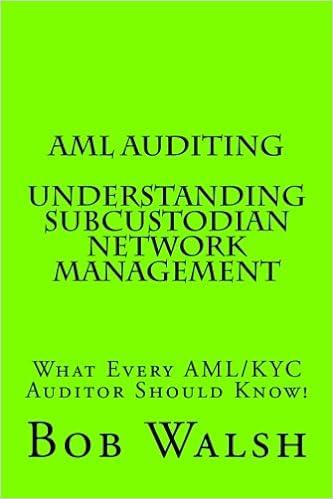Question
Each acquisition on average is $11 million dollars, so they are Materiality should be assessed on a class of transactions, so the acquisitions as a

Each acquisition on average is $11 million dollars, so they are
Materiality should be assessed on a class of transactions, so the acquisitions as a group are
$8 billion is
relative to the market value of equity ($60 billion) and earnings ($5 billion). Materiality is defined with respect to
The large negative share price reaction is an indication that information on the acquisitions is
immaterial
material
to investors. Information on how Tyco spends its money and what kinds of businesses it is buying is relevant to investors for
analyzing the accounts receivable turnover.
evaluating the credit score.
predicting future cash flows.
Summary disclosure of the net cash amount paid may be inadequate for investors; full disclosure of the nature of the acquisitions (line of business, price paid relative to book value) would be useful for predictions. Full disclosure may be very costly and impractical given the large number of acquisitions; management may have determined that the
benefits exceed the costs of disclosure.
costs exceed the benefits of disclosure.
information was not relevant to the users of the financial statements.
Management may have selectively concealed information on acquisitions, disclosing information on those that may be viewed favourably and hiding the bad acquisitions. Such concealed information, if it exists, would bias the financial statements and make them
comparable.
completed.
reliable.
unreliable.
This, in turn, increases the
moral hazard
prudence
substance over form
by allowing management to cover up its mistakes.
Accrual basis
Going concern
Market efficiency
suggests that the WSJ article provided new information to investors and the information was not what they had expected. The WSJ's revelation could indicate to investors that Tyco has been practicing
adverse selection
assessment of risk
going concern
by hiding bad news; therefore, they are now more sceptical of Tyco.
ZOOM IN 150% FOR CLEAR VIEW ON PICTURE
On February 4, 2002, the shares of Tyco International Ltd. (Tyco) plunged 10.4% as investors reacted to a report in The Wall Street Journal (WSJ) that questioned its disclosure practices. The WSJ reported that Tyco had not publicly announced US$8 billion of spending on 725 acquisitions in its past three fiscal years, broken down as follows: 5. Click on the icon to view the acquisitions data.) Tyco's chief financial officer explained that the company clearly reports the net amount of cash it pays for all acquisitions but does not disclose the details on its many smaller deals because they are immaterial. Tyco is an international conglomerate whose recent years' earnings have been about $5 billion; it has a market value of equity of $60 billion Requirement Discuss the issues raised by the above fact pattern in relation to the IFRS Framework and financial accounting theory Each acquisition on average is $11 million dollars, so they are Materiality should be assessed on a class of transactions, so the acquisitions as a group are $8 billion is relative to the market value of equity ($60 billion) and earnings ($5 billion). Materiality is defined with respect to The large negative share price reaction is an indication that information on the acquisitions is to investors. Information on how Tyco spends its money and what kinds of businesses it is buying is relevant to investors for Summary disclosure of the net cash amount paid may be inadequate for investors, full disclosure of the nature of the acquisitions (line of business, price paid relative to book value) would be useful for predictions. Full disclosure may be very costly and impractical given the large number of acquisitions; management may have determined that the V Management may have selectively concealed information on acquisitions, disclosing information on those that may be viewed favourably and hiding the bad acquisitions. Such concealed information, if it exists, would bias the financial statements and make them This, in turn, increases the by allowing management to cover up its mistakes. suggests that the WSJ article provided new information to investors and the information was not what they had expected. The WSJ's revelation could indicate to investors that Tyco has been practicing by hiding bad news, therefore, they are now more sceptical of Tyco. Data Table - Fiscal year # of acquisitions 350 Amount ($billions) $ 4.2 1999 2000 225 2.3 1.5 150 2001 725 $ 8.0 Total Print Done Done Click to select your answer(s)Step by Step Solution
There are 3 Steps involved in it
Step: 1

Get Instant Access to Expert-Tailored Solutions
See step-by-step solutions with expert insights and AI powered tools for academic success
Step: 2

Step: 3

Ace Your Homework with AI
Get the answers you need in no time with our AI-driven, step-by-step assistance
Get Started


